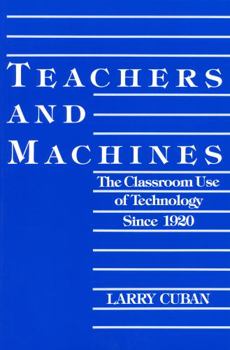Teachers and Machines: The Classroom Use of Technology Since 1920
Film and radio, television, and computers have each been heralded by reformers as a way to revolutionize classroom instruction by increasing productivity. "The promises implied in these aids caught educators' attention: individualized instruction, relief from tedium of repetitive activities, and presentation of content beyond what was available to a classroom teacher." How have teachers responded to the promise of improvement? To answer this question, Larry Cuban has gathered evidence from many diverse sources, constructing a history of technology and education that reveals hidden or ignored patterns in the teacher-machine courtship. He traces cycles of acceptance and denial; the enthusiasm of reformers; the initial optimism of the educational community; the hesitancy, doubts, and frustrations of teachers; and the very slow and limited acceptance of the new technology. He also asks, Why have so few teachers used machines? His answers, drawing from a range of disciplines, will prod readers into viewing the current passion for classroom computers in a different light. This now classic text provides a much-needed perspective on technology in the classroom.
Format:Paperback
Language:English
ISBN:080772792X
ISBN13:9780807727928
Release Date:June 1986
Publisher:Teachers College Press
Length:144 Pages
Weight:0.49 lbs.
Dimensions:0.4" x 6.0" x 9.0"
Customer Reviews
2 ratings
Excellent history of technology in 20th century eduction
Published by Thriftbooks.com User , 17 years ago
Excellent history of technology in 20th century eduction (until 1984). Radio, TV, film...all with promises, trajectories, and pitfalls similar(though not the same) to computers and the Internet. Cuban's description and analysis of the reactions of teachers, schools, and the educational establishment to technology are credible and insightful.
Technology adoption and failure in American education.
Published by Thriftbooks.com User , 26 years ago
Cuban reviews the attempts to adopt technology into American classrooms throughout the 20th century. Moving pictures, radio, TV, and other technology-based improvements were loudly acclaimed to herald a new paradigm for education. All attempts failed to make a dent in established curriculum and teaching. Cuban analyzes these failures, and applies his ideas to the current wave of technology edu-euphoria, the computer. I'm not sure his dire 1986 predictions are valid now, with the saturation of classrooms and tool-orientation that the modern computer offers. However, his book is essential reading if you want to think carefully before adopting technology in a school system. Learn from history, don't repeat it!






